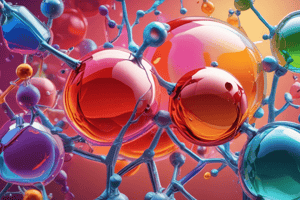Podcast
Questions and Answers
Alcohols can be classified as primary (1°, an alcohol with one carbon bonded to the oxygen), secondary (2°, two carbon bonds to the oxygen), or ______ (3°, three carbon bonds to the oxygen).
Alcohols can be classified as primary (1°, an alcohol with one carbon bonded to the oxygen), secondary (2°, two carbon bonds to the oxygen), or ______ (3°, three carbon bonds to the oxygen).
tertiary
Ethers are organic compounds containing an O-C-C (alkoxy) bond, where two organic groups are connected through an ______ atom.
Ethers are organic compounds containing an O-C-C (alkoxy) bond, where two organic groups are connected through an ______ atom.
oxygen
Alcohols are polar molecules, affecting their solubility in polar solvents like ______.
Alcohols are polar molecules, affecting their solubility in polar solvents like ______.
water
Phenols are aromatic alcohols, meaning they have an aromatic ring with an attached ______ group.
Phenols are aromatic alcohols, meaning they have an aromatic ring with an attached ______ group.
Signup and view all the answers
Phenols can act as strong acids due to the ability of the aromatic ring to stabilize the negative charge on the ______ atom.
Phenols can act as strong acids due to the ability of the aromatic ring to stabilize the negative charge on the ______ atom.
Signup and view all the answers
Alcohols can undergo dehydration to form ______
Alcohols can undergo dehydration to form ______
Signup and view all the answers
Alcohols can be oxidized to form carbonyl compounds such as ______
Alcohols can be oxidized to form carbonyl compounds such as ______
Signup and view all the answers
Phenols can be transformed into other functional groups like ______
Phenols can be transformed into other functional groups like ______
Signup and view all the answers
Phenols can undergo electrophilic aromatic substitution reactions, leading to the formation of ______
Phenols can undergo electrophilic aromatic substitution reactions, leading to the formation of ______
Signup and view all the answers
The applications of alcohols, phenols, and ethers are widespread in various industries, including ______, materials science, and environmental science
The applications of alcohols, phenols, and ethers are widespread in various industries, including ______, materials science, and environmental science
Signup and view all the answers
Study Notes
Organic Chemistry's Alcohol, Phenol, and Ether Insights
Organic chemistry encompasses the study of carbon-based molecules, and among its fundamental building blocks are alcohols, phenols, and ethers. These functional groups endow molecules with unique properties and allow for a wide array of chemical reactions.
Alcohols
Alcohols are organic compounds containing an OH (hydroxyl) functionality. They can be classified as primary (1°, an alcohol with one carbon bonded to the oxygen), secondary (2°, two carbon bonds to the oxygen), or tertiary (3°, three carbon bonds to the oxygen). Alcohols are polar molecules, which affects their solubility in polar solvents like water, and also their reactivity in various chemical reactions (e.g., oxidation, acid-base reactions).
Phenols
Phenols are aromatic alcohols, meaning they have an aromatic ring (benzene-like structure) with an attached OH group. Phenols can act as strong acids due to the ability of the aromatic ring to stabilize the negative charge on the oxygen atom. Like alcohols, phenols are polar, but their aromaticity provides them with unique reactivity and physical properties.
Ethers
Ethers are organic compounds containing an O-C-C (alkoxy) bond, where two organic groups are connected through an oxygen atom. Ethers are typically less reactive than alcohols and phenols, and they do not possess hydrogen atoms bonded to the oxygen. Their stability and nonpolar nature make ethers valuable solvents in organic chemistry.
Alcohols, phenols, and ethers are involved in numerous reactions and can be interconverted. For example, alcohols can undergo dehydration to form ethers, or they can be oxidized to form carbonyl compounds (e.g., aldehydes or ketones). Phenols can be transformed into other functional groups, such as nitro compounds, or they can undergo electrophilic aromatic substitution reactions.
Organic chemistry continues to expand our understanding of alcohols, phenols, and ethers, and the applications of these functional groups are widespread in various industries, including pharmaceuticals, materials science, and environmental science. The study of these molecules and their reactions has led to the development of new synthetic methods, the discovery of novel materials, and the advancement of our understanding of biological systems.
Studying That Suits You
Use AI to generate personalized quizzes and flashcards to suit your learning preferences.
Description
Explore the fundamental building blocks of organic chemistry - alcohols, phenols, and ethers. Learn about their unique properties, reactivity in chemical reactions, and applications in various industries.




